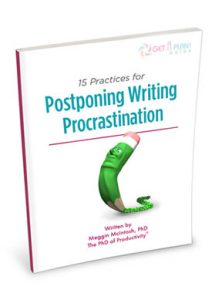Tips on When to Write by Gini Cunningham
 Write every day. Writing is a habit that should just slip into your schedule. Block it off on your calendar; block it off from your family; block it off from an outside interference.
Write every day. Writing is a habit that should just slip into your schedule. Block it off on your calendar; block it off from your family; block it off from an outside interference.
- Write today; edit tomorrow. Writing and editing require different skills and analysis techniques. When you separate them you will find that your productivity and quality improve. You’ll actually save time as you write more because you are not bogged down with second guessing your ideas.
- Set deadlines, whether true or arbitrary, and stick to them. Deadlines mean you have a plan of action to acquire your goals and that is a pleasant and rewarding way to do business. Adjust your deadlines only because you need more time to reach perfection, not because you wallowed in procrastination and excuses.
-
Create signs – for work and home:
Writer Writing – Do not disturb until…
You can even set a timer so that your family can see when it is all right to break into your writing.
- Set your timer and then unleash your keyboard. The first 5 minutes may be tough as you work to get the fingertips tapping. Then suddenly 10 minutes melt into 20, and 20 into 40. Once you hit the groove, ideas will explode onto the page and you will find it difficult to stop. Once your mind is immersed in your words, delightful messages will appear. The Freudian brain may pop into view with wordplay and cleverness you had never imagined you possessed.
- Try a writing retreat. A day at the beach, three hours at the library, the morning at your favorite coffee house. The point is to select a place where you can write away, right away, with “distractions” but none that directly distract you (no phone, email, side chatter).
- Proudly create your writing statement for when people ask you what you do: “I am a writer. My focus right now is _____; next I’ll be writing____.”
- Love writing every day. When writing is fun you are “in the zone”. Words and ideas flow and you will find yourself in high productivity mode. A positive state of mind and great writing are wondrous partners.
- Discover the magical activities that generate writing ideas and enhance your insight: running, walking, riding your bike, roller skating… Notice how physical activity enlightens and loosens your writing fluency. Television rarely ignites the brain the way that action and movement do.
- Save all of your writing. If you move to the editing stage and find a paragraph, a section, a chapter, that does not fit, cut and paste it into your “Special Junk File” or a file all of its own. You never know when you will need a good writing idea and by saving it you now have a foundation.
© Gini Cunningham (author of: The New Teacher’s Companion: Practical Wisdom for Succeeding in the Classroom (ASCD). In addition to her writing, Gini is a workshop leader, consultant, and writing coach. Through her consulting work, she provides (and guarantees): Full, undivided focus on your work, straightforward feedback and much more! Contact her at: gini.cunningham@sbcglobal.net
 Do you know any writers who procrastinate? Could that writer actually be you? We writers know perfectly well that we procrastinate, sometimes in very clever ways. In need of tips to help you stop? You’ll want the Get a Plan! Guide® to Postponing Writing Procrastination, part of the Get a Plan! Guides® series.
Do you know any writers who procrastinate? Could that writer actually be you? We writers know perfectly well that we procrastinate, sometimes in very clever ways. In need of tips to help you stop? You’ll want the Get a Plan! Guide® to Postponing Writing Procrastination, part of the Get a Plan! Guides® series.
Inside, you’ll find 15 practices to postpone your writing procrastination. You’ll receive the ideas and inspiration to do your work easier, faster, and in a more focused fashion.




